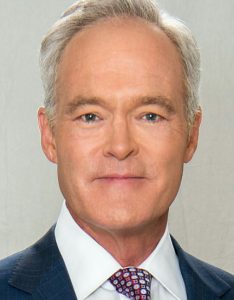The winner of the RTDNA’s Paul White Award is expected to talk about journalism’s loftiest aspirations, and Scott Pelley didn’t disappoint. The award, considered the organization’s highest honor, recognizes “lifetime contributions to broadcast and digital journalism,” and Pelley’s work on 60 Minutes and on CBS News over 30 years has certainly earned him the right to summon our better angels.

Pelley delivered a stemwinder of a speech as he accepted his award at the Excellence in Journalism conference in San Antonio last week. “When journalism stops caring about public service, the public stops caring about journalism,” he said. But Pelley, who cut his teeth as a local TV news reporter in Lubbock and Dallas/Fort Worth, also sounded a note that we’re starting to hear more and more in our work here at the Knight-Cronkite News Lab — namely that enterprise journalism can help a station not just do good, but do well. Here’s how Pelley put it:
When you get back to the newsroom on Monday, assign a reporter to look at whether the water in your town is being delivered to homes in lead pipes. Assign another reporter to use the Freedom of Information Act to check on the waiting list for the V.A. hospital. Assign another to look at what happened to all that bond money the voters approved five years ago. Check on the firefighter and police department pension funds.
And then don’t ask them to come back with an answer for the five o’clock news. Sure, you have to send this reporter out to the three alarm fire for the six o’clock news. Let this public service be their long-term project that they work on constantly in the background.
Imagine leading your broadcast with “Here’s what we found out about lead in your drinking water,” and watch your competitors try to catch up.
Coincidentally, Google just announced that it is tweaking its search results to favor original reporting — potentially a boost for enterprise journalism. And that notion of distinctive reporting as a way for newsrooms to survive and thrive in challenging times is also one of many ideas to emerge from an ambitious report out this week from the Medill School of Journalism at Northwestern University.

The report, Medill News Leaders Project 2019, is subtitled Sustaining the Business of Local Journalism. It’s based on interviews with 54 industry figures (including me) from print, digital, and broadcast, and the authors, rather than hammering out an all-encompassing synthesis, decided to curate the most salient quotes and tie them together in five sections: revenue models, nonprofit newsrooms, innovation, local TV, and the future of local news in general. (You can read the Nieman Lab’s summary of the report here.) According to the report’s executive summary, “Local television news is on the cusp of a major disruption in its business model resulting from rapid changes in technology, audience behaviors and viewer demographics.”
One of the report’s authors is Owen Youngman, who spent 37 years at the Chicago Tribune and helped move the paper into the digital age. He now serves as a Professor and Knight Chair in Digital Media Strategy at Medill. (The Knight Foundation also underwrites our work here at the Lab.) He told me local TV newsrooms — not just print operations — have no time to waste. “I think we all can see the trains coming down the track at us. But it’s difficult to judge the speed. And if you go in assuming that it’s faster than you want it to be, you’re going to act in a different way — a more effective way.”
Youngman told me that by trying to be all things to all people, traditional newsrooms run the risk of being caught between well-resourced national news providers and hyper-local digital upstarts. “Metro dailies and TV stations trying to serve all parts of a metro market find themselves in an undifferentiated middle, where they are not giving people a clear reason to prefer them unless they have the best weather person.” Youngman says the standard coverage produced by local TV newsrooms can easily be undercut by new competitors. “A byproduct of our decreased attention spans is that the craft that was necessary to do a 2:30 video piece for the nightly news matters less if somebody is willing to grab a 40-second bite from someone with less training and polish than you.”
What would Youngman say specifically to local TV news directors? “I want you to understand that what worked yesterday is going to work marginally less well tomorrow and dramatically less well in the future. But there are things that are happening across the country, and not just in TV, but in digital startups that focus on video, that have lessons that are not that expensive to adopt. And that could really be interesting for you.”
There are relevant observations throughout the Medill report across a wide range of topics, and a number of them reminded me of Scott Pelley’s rousing message of the week before. “GOOD JOURNALISM IS GOOD BUSINESS,” reads one headline from the section called The Future of Local News. “Because it’s essential for news outlets to differentiate themselves in order to survive, this difficult era may actually be beneficial for quality journalism,” the report’s authors say. And more specifically: “Being perceived as a provider of ‘commodity news’ is dangerous, and setting yourself apart with established excellence on specific topics is differentiating successful local news organizations from their competitors.”
Scott Pelley wasn’t the only network news star honored by the RTDNA last week. His fellow San Antonio native, ABC’s John Quiñones, won the John F. Hogan Distinguished Service Award for “contributions to the journalism profession and freedom of the press.” Quiñones, the son of a janitor and a maid, gave a moving speech about his journey from a childhood in San Antonio’s West Side barrio — he spoke no English when he entered public school at age 6 — to his recent walk across Times Square, where he saw his name in lights as the host of a network news program. (You can watch Quiñones’s speech here.) Quiñones called on journalism to serve as “a candle in the darkness.” And Pelley echoed the metaphor: “With every newscast, with every refresh of your website, ask yourself, ‘Am I a light in this gathering void of ignorance?’”
The Medill report, which shines its own light where the mission of journalism and the business of journalism meet, puts it this way:
“It’s time to become indispensable.”